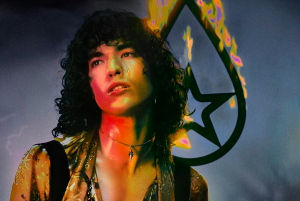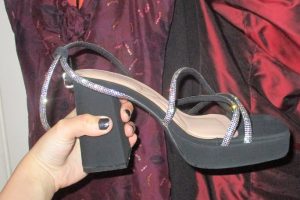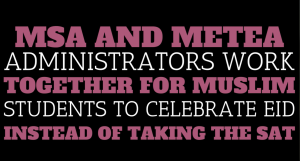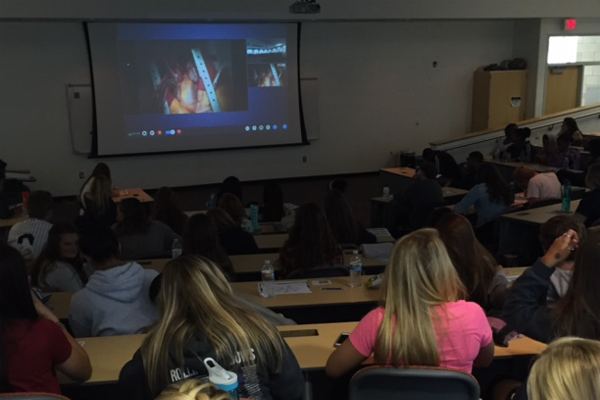By Drew Danko
Online Editor
Photo by Jack Heerhold
Students in advanced health and anatomy and physiology travelled into the operating room of an aortic valve replacement, via Skype, Wednesday morning in the forum room. “Live From the Heart” is a program hosted by the Museum of Science and Industry in Chicago that allows high schoolers the opportunity to see live heart surgeries performed at Advocate Christ Medical Center.
“‘Live From the Heart’ is a program that the Museum of Science and Industry puts on, which you apply to be a part of. Typically it is a bypass procedure, but Wednesday it was a little different because it was an aortic valve replacement,” advanced health teacher and organizer Lauren Reineking said.
According to The Cleveland Clinic, the aortic valve is a one-way valve between the heart and the aorta, the main artery from the heart that distributes oxygen-rich blood to the body. Valves are replaced with either a biological, donor, or artificial valve. Abnormalities at birth, or disease in older age can cause heart disease and aortic valve diseases that require replacement. Students observed the successful valve replacement of a 62-year-old crane operator.
The program provides students interested in the medical field a rare peer into the operating room. “I am interested in going into the medical field, so I wanted to see what they do firsthand,” junior anatomy student Leana Goldman said.
Many students are familiar with a cardiothoracic surgeon or nurse, however the program allows students to observe many other types of positions in the medical field and operating room. “Everyone seems to know what a nurse or surgeon does, but they also get to better know what a perfusionist or an anesthesiologist does as well. They also get a better sense of what actually happens in the operating room, both with regard to the surgery and staff,” manager of student experiences for the Museum of Science and Industry, DeDee Ludwig-Palit said.
Beside just being able to witness the surgery, students were also given the opportunity to ask questions and talk to the surgeons. “It was really interesting how we were able to have a question and answer session with them and each person in the room gave us an overview of what they do,” Goldman added.
Student questions ranged from risk factors regarding the surgery, to schooling necessary to become a cardiothoracic surgeon. The question and answer session, as well as viewing the surgery, reassured many students about the safety of the surgery. “A lot of us might have to go through it, or be the one performing the surgery, so we should know what they are doing to the body,” senior advanced health student Danielle Havlik said.
Goldman believed seeing the surgery also cleared up many of the stigmas and myths regarding heart surgery, or any surgery, for that matter. “I learned a lot. I imagined it would be really bloody and lots of people doing things inside of the heart, but it was really organized. The heart did not look like what I thought it would look like, it didn’t seem as gruesome and bloody,” Goldman said.
Since first offering the program in 2004, the Museum of Science and Industry has streamed “Live From the Heart” to more than 47,000 students and 1,200 different groups. “By allowing groups to talk with surgical staff while they’re actually in surgery, not only do they learn more about heart surgery, they also connect to professionals in a way they usually wouldn’t have access to,” Ludwig-Palit added.
This story has been modified from its original version to include information from DeDee Ludwig-Palit from the Museum of Science and Industry. (9/25/15 1:32 pm)






